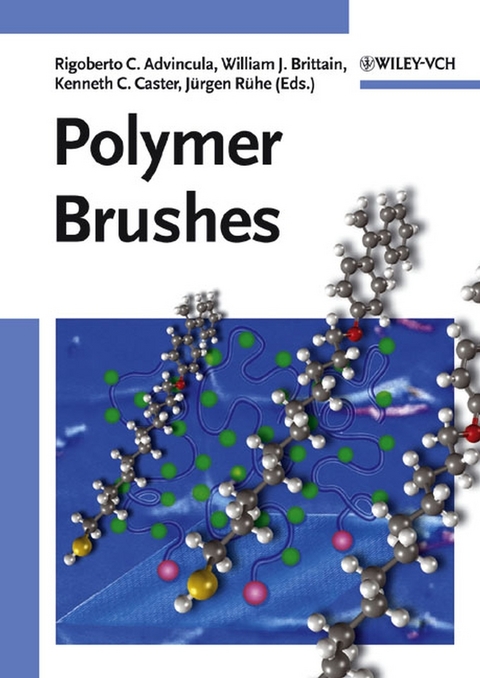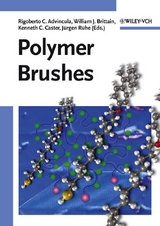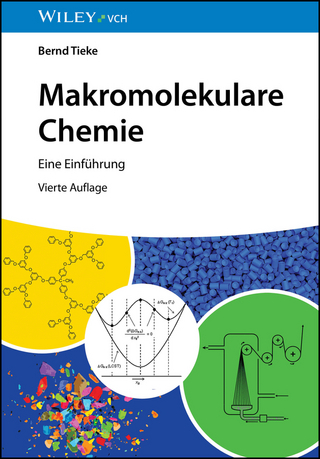Polymer Brushes
Wiley-VCH (Verlag)
978-3-527-31033-3 (ISBN)
- Titel ist leider vergriffen;
- Artikel merken
Materials scientists, polymer chemists, surface physicists and materials engineers will find this book a complete and detailed treatise on the field of polymer brushes, their synthesis, characterization and manifold applications. In a first section, the various synthetic pathways and different surface materials are introduced and explained, followed by a second section covering important aspects of characterization and analysis in both flat surfaces and particles. These specific surface initiated polymerization (SIP) systems such as linear polymers, homopolymers, block copolymers, and hyperbranched polymers are unique compared to previously reported systems by chemisorption or physisorption. They have found their way in both large-scale and miniature applications of polymer brushes, which is covered in the last section. Such 'hairy' surfaces offer fascinating opportunities for addressing numerous problems of both academic and, in particular, industrial interest: high-quality, functional or protective coatings, composite materials, surface engineered particles, metal-organic interfaces, biological applications, micro-patterning, colloids, nanoparticles, functional devices, and many more. It is the desire of the authors that this book will be of benefit to readers who want to "brush-up on polymers".
Rigoberto C. Advincula is currently Associate Professor at the Department of Chemistry of the University of Houston. He obtained his bachelor's degree from the University of the Philippines in 1987 and his PhD in Chemistry at the University of Florida seven years later. He was Alexander von Humboldt Research Fellow at the Max Planck Institute for Polymer Research in 1995 and the following year a Research Fellow at the Department of Chemical Engineering, Stanford University. In 2003, Dr. Advincula was one of the recipients of the Arthur K. Doolittle Award given by the Polymer Materials Science and Engineering division of the American Chemical Society. His current research interests are in the area of organic and polymer materials as applied to nanoscale building blocks and phenomena, with applications focusing on electro-optical properties, biofunctional systems, and surface modifiers. William J. Brittain is currently Professor at the University of Akron, Department of Polymer Science. He obtained his bachelor's degree from the University of Northern Colorado in 1977 and his PhD in Chemistry at the California Institute of Technology in 1982. Following a postdoctoral fellowship at Duke University and 6 years in Central Research and Development at E. I. DuPont, he joined the Uni Kenneth C. Caster is currently Senior Research Scientist within the Center for Biologically Inspired Materials and Materials Systems at the Pratt School of Engineering, Duke University. He obtained his bachelor's degree from Stetson University in 1979 and his PhD in Chemistry from Duke University in 1983. He was a National Institutes of Health Postdoctoral Fellow at the University of Florida from 1983 to 1985, thereafter he spent 18 years in industrial R&D, first at Union Carbide Corporation in new product development and catalysis research, followed by 9 years at Lord Corporation, as principle investigator of new materials research in the Lord Materials Division. In 1998, Dr. Caster was joint-winner of the Lord Corporation Chemical Products Division Technical Achievement Award for innovation and development of Contact Metathesis Polymerization. He has extensive experience from basic R&D to process development, and his areas of expertise include ring-opening metathesis polymerization, organophosphorus chemistry, catalysis, ligand design and synthesis, heterocyclic chemistry, and small molecule molecular modeling. Jürgen Rühe has been Professor for Chemistry and Physics of Interfaces at the University of Freiburg since 1999 and since 2001 he is also director of the Institute for Microsystems Technology. Prior to this, he was associate professor at the Max-Planck-Institute for Polymer Research. He has been visiting scientist at the IBM Almaden Laboratories, at the RIKEN Institute in Tokyo, Japan, the Cavendish Laboratories of Physics, Stanford University and Georgia Institute for Technology. Professor Rühe has won the prize for Chemistry awarded by the Academy of Sciences in Göttingen (1999) and the DECHEMA award 2001. His research interests are directed towards the development of new methods for the generation of tailor-made surfaces and the use of polymers in nanosciences and microsystems technology.
OVERVIEW
Polymer Brushes: On the Way to Tailor-made Surfaces
SYNTHESIS
Recent Advances in Polymer Brush Synthesis
Polymer Brushes by Atom Transfer Radical Polymerization
Polymer Brushes by ATRP Initiated from Macroiniator Synthesized on Surface
Synthesis of Polypeptide Brushes
Bottle Brush Brushes: Ring-Opening Polymerization of Lactide from Poly(hydroxyethyl methacrylate) Surfaces
Preparation of Well-Defined Organic-Inorganic Hybrid Nanostructures Using Living Cationic Surface-Initiated Polymerization from Silica Nanoparticles.
Photoinitiated Polymerization from Self-Assembled Monolayers.
Recent Advances in the Synthesis and Rearrangement of Block Copolymer Brushes
Surface-Grafted Hyperbranched Polymers
CHARACTERIZATION
The Analysis and Characterization of Polymer Brushes: from Flat surfaces to Nanoparticles.
Characterization of Polymer Brushes on Nanoparticle Surfaces
Spherical Polyelectrolytes
Weak Polyelectrolyte Brushes - Complex Formation and Multilayer Built-up with Oppositely Charged Polyelectrolytes
Structure and Properties of High-Density Polymer Brushes
Behavior of surface-anchored poly(acrylic acid) brushes with grafting density gradients on solid surfaces
Kinetics of Polymer Brush Formation With and Without Segmental Adsorption
APPLICATIONS
Applications of Polymer Brushes and Other Surface-Attached Polymers
Polymer Brushes: Towards Applications
Polymerization, Nanopatterning, and Characterization of Surface Confined, Stimul-Responsive Polymer Brushes
Mixed Polymer Brushes, Switching of Surface Behavior and Chemical Patterning at the Nanoscale
Local Chain Organization Of Switchable Binary Polymer Brushes in Selective Solvents
Motion of Nano-objects Induced by a Switchable Polymer Carpet
Photochemical Strategies for the Preparation and Microstructuring of Densely Grafted Polymer Brushes on Planar Surfaces
"Polymer Brushes ist eines der ersten Bücher, das sich dem Thema Polymerbürsten widmet. ... Den Herausgebern und Autoren ist ein Buch gelungen, das zum richtigen Maße allgemeine Informationen über Polymerbürsten mit detaillierten Forschungsergebnissen verbindet und dem Leser den aktuellen Stand der Forschung umfassend und verständlich vermittelt. Die Lektüre ist beidermaßen für Einsteiger in die Thematik und für Fachleute, die sich für die neuesten Entwicklungen interessieren, hervorragend geeignet."
Angewandte Chemie und International Edition
| Erscheint lt. Verlag | 27.7.2004 |
|---|---|
| Sprache | englisch |
| Maße | 170 x 240 mm |
| Gewicht | 1085 g |
| Themenwelt | Naturwissenschaften ► Chemie ► Organische Chemie |
| Recht / Steuern ► Wirtschaftsrecht | |
| Technik | |
| Schlagworte | Chemie • Chemistry • Dünne Schichten, Oberflächen u. Grenzflächen • Electrical & Electronics Engineering • Electrical & Electronics Engineering • Elektrotechnik u. Elektronik • Materials Science • Materialwissenschaften • MEMS • Methods - Synthesis & Techniques • Methods - Synthesis & Techniques • Nanomaterialien • nanomaterials • Nanotechnologie • nanotechnology • Organic Chemistry • Organische Chemie • Organische Chemie / Methoden, Synthesen, Verfahren • Polymere • Polymer Science & Technology • Polymer Science & Technology • Polymersynthese • polymer synthesis • Polymerwissenschaft u. -technologie • Thin Films, Surfaces & Interfaces • Thin Films, Surfaces & Interfaces |
| ISBN-10 | 3-527-31033-9 / 3527310339 |
| ISBN-13 | 978-3-527-31033-3 / 9783527310333 |
| Zustand | Neuware |
| Informationen gemäß Produktsicherheitsverordnung (GPSR) | |
| Haben Sie eine Frage zum Produkt? |
aus dem Bereich




